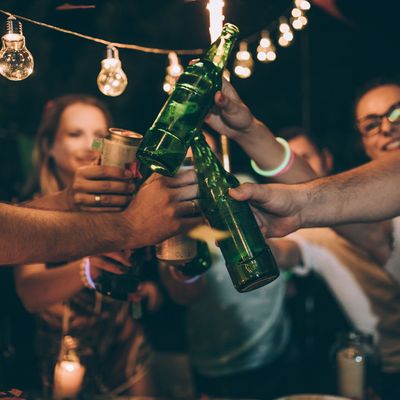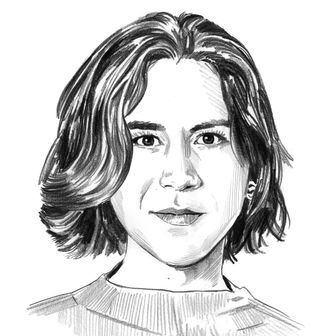
Please note the story you’re reading was published more than a day ago. COVID-19 news and recommendations change fast: Read the latest here to stay up-to-date. We’ve lifted our paywall on all essential news and updates about the coronavirus.
On any given weeknight at the Bushwick tiki bar Happyfun Hideaway, there are dozens of Tecate–slurping, margarita-sipping young Brooklynites. When the weather takes a warm turn, that number doubles as droves of drinkers show up in the backyard, Telfar bags in hand. On Wednesday night, however, despite the onset of spring weather, the crowd had thinned, as people across New York began to grapple with the question of how to navigate life in the middle of a pandemic.
At 9 p.m., six young people sat inside: one man, blasted and teetering upon his stool, two men eating each other’s faces, and three more chatting in a grimy corner.
In the last hour, Trump had mandated a travel ban, the NBA season was canceled, and Tom Hanks announced he had tested positive for the virus, but the mood among the Gen-Zers at the bar remained light. The kissing couple was soon replaced by another heavy-petting duo. “I went to the grocery store today,” purred one of them. The bartender said, “I think people are scared, but it’s overblown. There’s an arc to everything.”
On the patio, conversation between college students returned to coronavirus every few sentences. “The thing is, young people shouldn’t travel. As a young person you should stay away from traveling and large crowds,” a young woman studying at Pratt argued. Her Kurt Cobain–looking companion retorted, “But I’ve never had the money to go to L.A.,” talking about cheap airline tickets. The conversation lulled, briefly, before he added, “Each cigarette you roll is a work of art.”
They drifted from conversations about moving apartments back to the virus’s impact on their graduations, from breakup drama to information they’ve gathered about the virus (“I don’t think my sister made that up. She works in politics”).
The boy joked about video-chatting into his class at NYU, telling the professor he tested positive in order to get out of class, and made snarky comments about a neighborhood DJ: “I’m glad the coronavirus has derailed his career.”
A couple of young women on the patio displayed similar nonchalance. One shook my hand, then immediately lit a cigarette, putting her fingers to her lips without pausing to apply hand sanitizer. Asked whether or not they felt any hesitation going out for drinks, they chimed together, “Oh! No! No! Not at all!” Have they done any prepping? “God no. Last I checked there’s plenty of toilet paper on the shelves.” When I asked if they would consider canceling their weekend plans, they said no. “I’m still on Resident Advisor [an online electronic music community] like, ‘Whats up?!’”
“It’s chilling. It’s something you can’t really avoid, even if it was as deadly as some people think it is,” said another Pratt student to her friend, a blonde-bobbed NYU grad. “I use the subway every day, so I’m fucked either way … Now that I need to take care of today, I’m just like ‘Why would I think about the future?’”
For members of my generation, the COVID-19 pandemic is our first major crisis, and it’s hard to see my peers’ corona-nihilism outside of the major political and historical events that have happened during our lifetimes. We are an age group (18 to 23) that, for the most part, doesn’t remember 9/11 or the 2008 financial crisis. We don’t know the existential dread of impending war or impending bankruptcy. The 2016 election was a crisis, but it was also one we were able to tangibly react to, through student activism and renewed interest in policy.
Texting with nearly a dozen friends my age, living in places from Alabama to Los Angeles to New York, I asked if they were worried about the virus. For the most part, they are worried, but mostly about marginalized communities and health-care workers and the possibility of becoming walking death traps for the elderly. As for themselves, one friend in New Haven said, “Self-isolation for a month is a lot in a college student’s life. Also, on a less serious level, I’ve had to cancel a bunch of dates.”
Knowing they aren’t the primary target of the virus, they tweet things along the lines of “The way boomers are feeling about coronavirus is the way millennials and gen z folks feel about climate change all the time,” and make coronavirus memes. One is a drinking guide to online lectures; another reads, “Well I’d rather be dead in [insert name of a shitty college town], then alive in my hometown.” They make TikToks, one to the tune of “That’s Amore”: “When the class moves online, and the boomers all die, that’s corona!”
As tasteless as these conversations might seem to older folks, it’s also difficult to imagine my generation not reacting this way. Born into a dying world, ultraconscious of the overheating planet, our nihilism makes sense. But then, this prideful sense of invincibility may well just be characteristic of anyone that age. Per Didion, “[O]ne of the mixed blessings of being twenty and twenty-one and even twenty-three is the conviction that nothing like this, all evidence to the contrary notwithstanding, has ever happened before.” In this case, it’s true — for Gen-Z, corona is a coming-of-age crisis, the likes of which we haven’t seen before, and it’s hard to know whether or not to have a Wednesday night tiki drink.
This morning, a college sophomore texted me, “If I haven’t died yet from my Juul or the nasty ass bar I work in, I think I’ll survive the coronavirus.”





